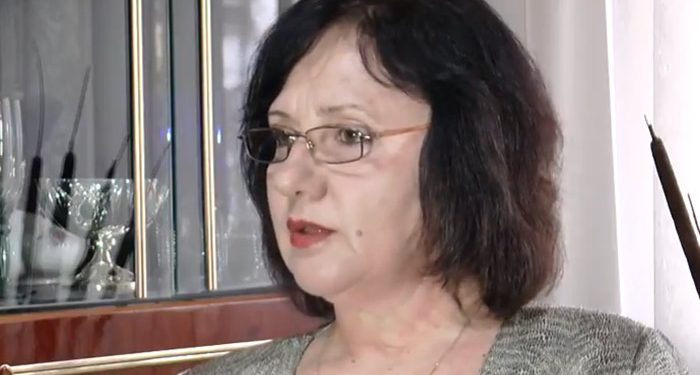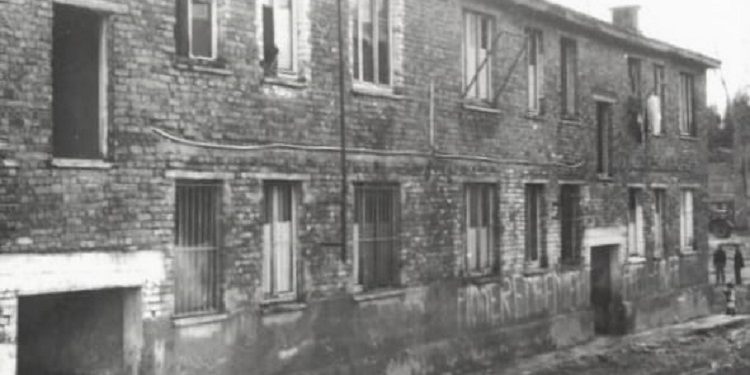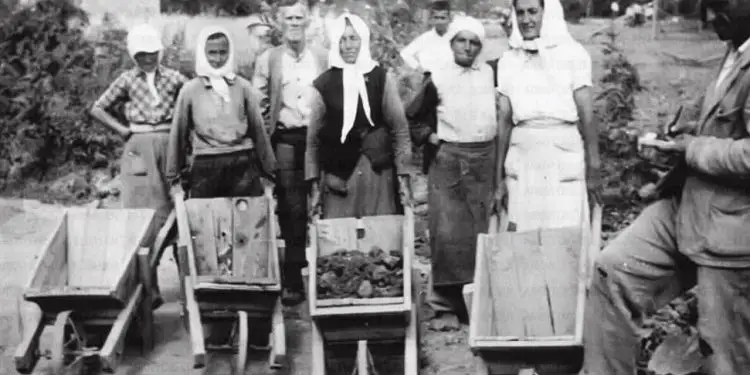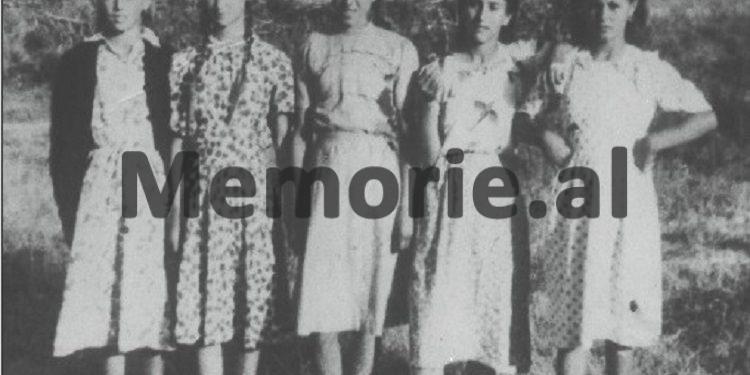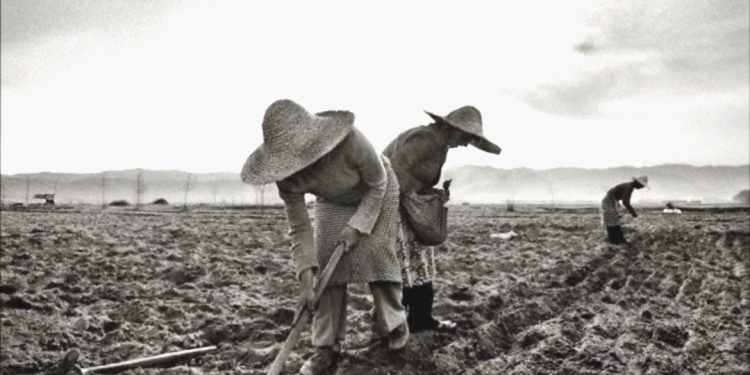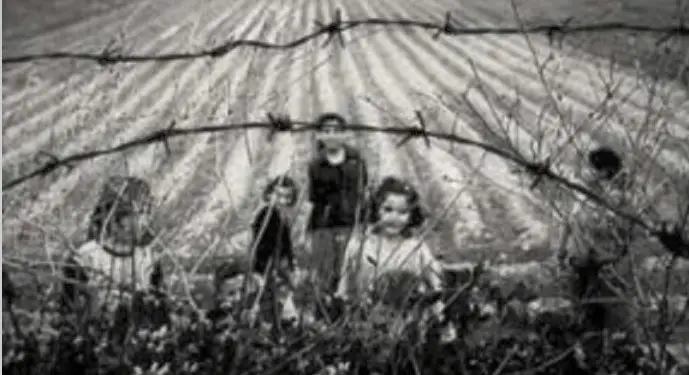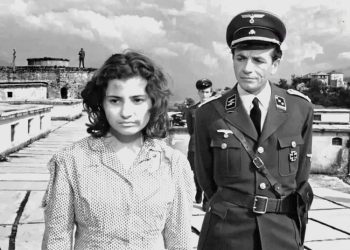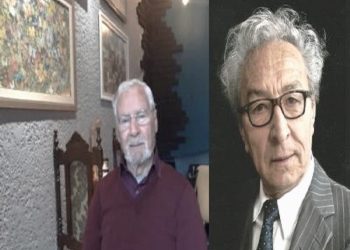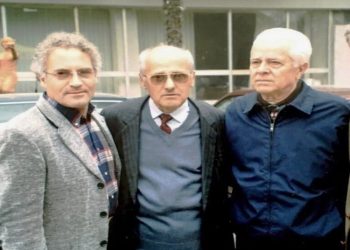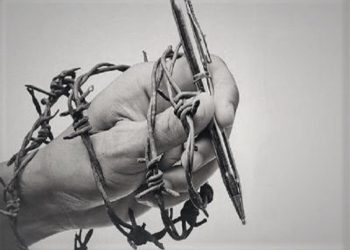By Alma Liço
“The weight of memory”, a story by Alma Liço –
Memorie.al / It was a clear and fresh March morning. The sun shone in all its glory, inspiring, as it knows how to be in the magical season of spring. The chaos of cars and passers-by on the city streets seemed to dim that magic somehow. The railed wall on the side of the sidewalk I was crossing made me realize that I was near the school I was headed for. As I entered its interior, a special emotion came over me. Although the visit to that school was planned by an organization that has been active for years in the field of collective memory of the communist period, I could not avoid the reflection of a bitter nostalgia.
I was surrounded by the hazy retrospect, covered with purple clouds. So present was a sad thought, a difficult relationship, a disturbing turmoil that had at its foundation insult, abandonment and rejection.
Not without curiosity, I met the carefree faces of some young people, who were sort of sleepy, to get to their classes as soon as possible. Perhaps, the night before they had surfed for many hours on the Internet, this phenomenon has already turned into an epidemic. However, even for them, that day would be somewhat different from the others. So, the corridors and stairs hummed with the voices of young people, who greeted and wished each other good morning.
In the front part of the school lobby, next to the stairs that connect the first floor with the second, a large sign was placed. I approached. The photos of outstanding students were displayed on it. Boys and girls who glowed with appreciation and success. I was trying to imagine these radiant young people, in the banks of the most prestigious universities in the world, and this was more reasonable and possible.
Despite the difficulties that could be related to the specific situation and the economic situation of everyone’s families, those boys and girls were free to dream and fly towards the aspirations of the future.
Naturally, I placed myself under the relaxing influence of a bright expectation of their perspective, but by analogy, I could not help but remember that forty-three years ago, next to the portrait of the dictator, the absurd communist slogans, and some photos others, there was also a sad photo, exactly a photo of me, placed on such a board, which was the reason for throwing me out of school. Someone who knew about my family’s deportation recognized me in that photograph.
The desperate effort to be invisible, far from any prominence, had proved useless. I, the daughter of a family declared an enemy of the communist state, had no right to an education. I had to live near my family, to drown in the mud of oppression and cruelty, as it happened.
Hmmmm……! Would they be able to understand these young people who were smiling happily from the color photos of pride and appreciation, that a girl of their age, forty-three years ago, was thrown into the street just because she dared to touch success…?! Would it be possible for me, with my testimonies and memories, to shed light on the cruelty of the years of the dictatorship, which did not spare from its monstrous repression, even the most innocent creatures, such as children?
As hard as it seemed, I had to do it. At least I had to try. The politics of post-communism had covered with the dust of oblivion, all that terror experienced during the years of the dictatorship. A pronounced lack of will accompanied the necessity of confronting the crimes of the communist regime.
Paradoxically, that dark period of Albania’s history continued to be presented distorted and alienated. And how could it be otherwise, when it was conceived and written by pseudo-historians, emerging from the dark tunnels and laboratories of the dictatorship’s demagoguery?
A few minutes later, I took a seat in the first row of the school library, which apparently also served as a meeting room or special events. Next to me, sat the organizer, the implementer of the project, and behind her, some of the teachers of that school. Behind us sat the students, who, through whispers and some careless noises, conveyed a kind of impatience for everything that would be transmitted and witnessed that day.
The lighting announced that the screening of the documentary “Children of the Dictatorship” was about to begin, starring four people who, through harrowing testimonies, would bring the horrors experienced in the internment camps. Indelible childhood memories, which had marked their lives with traces of cruelty, perhaps among the most merciless and unusual of all time.
Children who were punished for the political beliefs of their grandfathers or fathers. And this tragedy happened in times of “peace”, in the “enlightened” period of the construction of socialism. One of the characters in that documentary was me.
Although with great difficulty I managed to face the memories and face the interviews, watching that documentary as a spectator was more than pain. As much as I would try to control it, I felt a lump in my throat that almost took my breath away and made me cry silently.
It seemed so incredible, so insufficient, that those minutes recorded on that film should convey intact the image of innocence and the desperate, silent images of abuse, bearing the burden of injustice, oppression, denial and rejection, unfortunately spread over so many years of a child’s life…!
It was, so to speak, a painful flashback, but so necessary to shed some light on that terrible past, deliberately shrouded in darkness and oblivion. It was a modest effort, to bring it to the consciousness of those young people who did not live, nor do they know that era with inhuman content.
Fifty minutes later, the soundtrack and subtitles announced the end of the documentary. With shaking hands I tried to wipe away the tears. In the meantime, I was eager to learn how the young people had experienced those chilling stories, and if they eventually wanted to ask any questions.
I changed my position and took a seat at another table in front of them. A little confused, I managed to distinguish sad girls, excited boys, but also young people who, with their open eyes, conveyed surprise, to the limits of disbelief.
A few minutes of reflection were enough for many of them to ask for more details about the terrible episodes of the lives of the children of the dictatorship, and not only. In the meantime, I had managed to restore my emotional balance and I felt ready to talk with those young people, about their uncertainties or perception about the shocking evidence of the documentary, unknown and unimaginable events for them.
Surprisingly, I began to feel somewhat relieved…to speak in front of those girls and boys about the sufferings lived, uncensored, unblackmailed, was a kind of “revenge”, peaceful to the atrocities suffered. How many fellow sufferers were never lucky enough to share their pain with others?
How many eyes, they closed their eyes in the internment camps or behind the bars of the prison, without being able to enjoy, even for a single day, freedom? How many children died tragically in silos-stables, surrounded by barbed wire, from hunger or the cold? Well, I was privileged. Indeed, I felt lucky at that moment. An orientation, an invisible force, had given me the right to testify on their behalf.
With the characteristic sincerity of the age, some of the young people brought the difficult experiences of their families’ attitude in relation to the dictatorship. Someone complained that they could not convince the communist grandfather, about the lack of freedom of that system, and someone else, about the extreme poverty and isolation of those years. Some even brought sad stories of family persecution, narrated by their parents or grandparents.
Suddenly, the emotional conversation with those young people was interrupted by a teacher, who was sitting in the first row. Broken in the face, she could not bear that through irrefutable facts, the system was being dared to be unmasked, with which, apparently, the indoctrination and petty interests of her family connected her.
Everything went dark for me. In an incomprehensible way, the image of that suffocating woman appeared to me in another background. In the eyes of my imagination, I saw dozens of disfigured women and girls, possessed by the demonic power of the dictator, crying and screaming at his funeral.
Some of them tore their faces and pulled out their hair. As tragic as it is paranoid, those faces and faces killed, disfigured by malnutrition and animal treatment. That teacher who was sulking seemed to me to be one of those miserable women who resembled unfortunate patients who had just violently left the psychiatric hospital.
….O God…..Though it has been thirty years since the dictator passed away, can his ghost still roam undisturbed, continuing to this day to poison our lives…???!! !
Blackened from head to toe, that teacher expressed her displeasure with the development of that activity, requesting that, for a balance of experiences, war veterans should also be invited to recount their happy and glorious experience during the years of the dictatorship.
That exalted woman could not accept any other reality, except the one forcibly imposed by her followers. A teacher, an educator who had to convey love, understanding, why not, and pity from a wife or mother, for the unparalleled terror that the Albanians, executioners of the regime, caused to their countrymen, moreover, that in this particular case, the victims were children .
That teacher’s reaction was an unpleasant surprise for me. I was not so naive as to believe that the nostalgia and fanatics of the communist system do not exist, even unfortunately, they are in abundance and present with all their bile, but I had hoped that, at least that day, filled with confessions shockingly, there would be no room for such contradictions.
The ghastly evidence of that day was more than enough, in respect of those pains, fixed in the hurt consciousness of four children, in the total lack of sensitivity of that teacher, at least to be silent.
I had no motivation to reply to that frowning lady, since the purpose of the conversation with the young people was to truthfully convey the episodes lived under the terror of those years.
She had no desire to wake up, and even stubbornly and aggressively refused such an opportunity. It was destined to remain unmoved in its endless lethargy and intolerance, and never to break from the indoctrination of the obedient slave.
……Relieved, but sad at the same time, two hours later, we left that school, accompanied by heartfelt thanks from the students, who then rushed to their classes. Thus, the sun had continued its unstoppable journey, and I felt it greet me from above. A solitary white cloud was rushing to leave the blue space as soon as possible.
The warmth of that day had merged with the images of hundreds of thousands of victims wandering precariously in the labyrinths of oblivion and indifference. Their voices in space resembled the sounds of a heavenly symphony that modestly joined the honest and thrilling narration of the characters of that day.
From the towers of the castle of neglect, the refrain of denied freedom and missing justice was repeated. Those sounds carried the encouraging calls of the voices of memory….!
……Let’s not forget, never forget what happened. We cannot walk towards the light without first illuminating the darkness, in whose ruins we have been forced to writhe and crawl for half a century.
We owe it to ourselves, we owe it to the hundreds of thousands of victims who failed to survive the horrors of the dictatorship, we owe it to the currently confused perspective of the children who were born and are growing up in the post-communist years. Memorie.al




